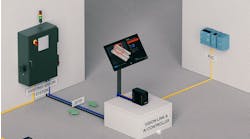Over the last decade, manufacturers such as General Motors, Dow Chemical, Anheuser-Busch InBev, Owens Corning, P&G, and Mars have significantly increased their purchasing of renewable energy as a means to power their facilities across the U.S. Yet many of these manufacturers now face a challenge in accessing the clean energy they want and need, due to state policies that limit corporate renewable energy procurement.
A new report, “The Growing Demand for Renewable Energy Among Major U.S. and Global Manufacturers,” by David Gardiner and Associates finds that 83% of the 160 manufacturers have established greenhouse gas reduction targets and 25% have established renewable energy targets.
These public commitments are made for a variety of business reasons: to diversify energy supplies, help companies demonstrate corporate leadership and innovation, and reduce energy and climate risks to their operations. One of the primary reasons is to reduce energy costs, as renewable energy – particularly wind and solar – is now among the cheapest and cleanest generation resources in the U.S.
On Sept. 19, General Motors announced plans to purchase 200 megawatts (MW) of clean, renewable wind energy from wind farms in Illinois and Ohio to help power the company’s facilities in Ohio and Indiana. The projects represent a significant amount of investment by developers Starwood Energy Group and Swift Current Energy. The company has signed 100 MW power purchase agreements (PPAs) with Starwood in Ohio and Swift Current in Illinois, procuring enough energy to meet the electricity needs of its Fort Wayne Assembly, Marion Metal Center and Bedford Casting plants in Indiana and Lordstown Assembly, Defiance Casting Operations, Parma Metal Center and Toledo Transmission Plants in Ohio.
“At General Motors, we’re fully committed to supplying all of our electricity needs, in the U.S. and abroad, with 100% renewable energy by 2050,” said Rob Threlkeld, global renewable energy manager at General Motors. “This is a business decision for us, because renewable energy is clean and provides more stable energy costs. Wherever possible, we hope to source that clean energy from within the states and communities where we operate.”
For the ten states that host the largest number of facilities for manufacturers that have set 100% renewable targets, four states (Michigan, Missouri, North Carolina and Tennessee) are in the bottom 25 in the ranking of favorable regions in the U.S. for corporate customers seeking to power their operations with renewable energy. That means more than 100 manufacturing facilities that need to be powered by 100% renewable energy are located in states that limit corporate access to renewable energy.
“More and more, manufacturers are engaging directly in energy policy advocacy in the states where they operate,” said report author Alexandra Rekkas, Senior Research Associate at David Gardiner and Associates. “In fact, our report finds that manufacturers lead other sectors in state renewable energy policy advocacy. States that want to attract and retain major manufacturers should keep this in mind, and make it as easy as possible for businesses to buy the renewable energy they want.”
To advance the development of renewable energy, the report suggests a variety of actions that states can take to remove legal and policy barriers so that manufacturers can buy clean, cheap renewable power locally.










